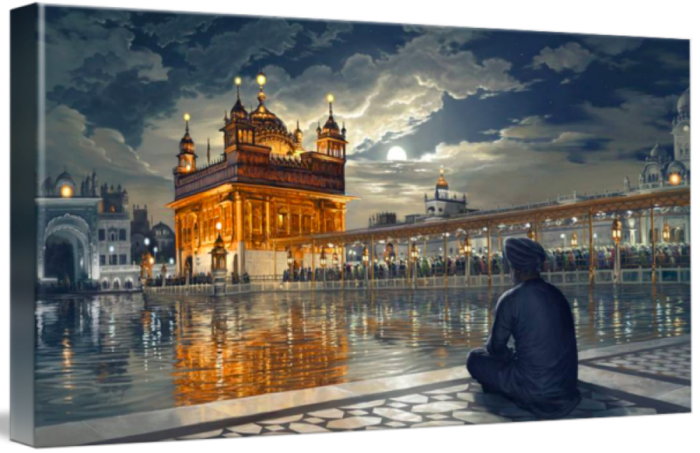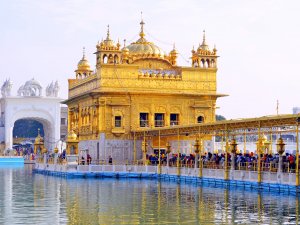Here, I will confine myself to an overview and simple description of Naam. Naam Simran will be discussed on another occasion, as it can be viewed as a methodology to steadily program the Mind to be hardwired for Naam enlightenment. It will be taken as another topic of discussion in a separate blog.
This blog will define only Naam.
Naam is the first of the three doctrinal terms, Naam, Daan, Isnaan, that formed the basis of Guru Nanak’s teaching. Their doctrinal authority was discussed in the last posting of this blog.
Does Naam mean Name?
Naam literally means a name or an identity of a person, a thing or entity. For this essay, I will follow the usual convention of treating Naam to mean the name or identity of the Creator or God or the Eternal Truth, not of any person or deity. Consider Naam as a generic term used to denote Ultimate Reality.
Ordinarily, a person’s name is a signifier, a code that reveals the full credentials of that person. The name will tell the age, address, education, work history, strength and weakness of that person. It will be the identification of the owner of that name. A name is also a means designation, reputation, fame, family or clan of that person. Similarly, Naam is all of those things and more of the code name God.
Naam is an expression of God
Naam in Sikhi-sm is the identity of Ultimate Reality, or what Guru Nanak called Ek-Onkaar, which literally means “One ultimate but the virtual reality that is manifested in all creation.” Guru Nanak designed a symbol for this entity:

The symbol became the Sikh insignia: all Gurus used it as their signature. You will see it displayed in every religious place of the Sikhs as well as in the Sikh homes.

Ek-Onkaar has a comprehensive spiritual and divine connotation. It also means that every unit of the creation is the essence or part of the Universal Soul. Since the Divine cannot be touched through human senses or be related to directly, Guru Nanak rightfully named it Ek-Onkaar and Guru Arjan started the Sikh scripture with this symbol.
Naam, like the Truth it signifies, has no physical shape and form. But the invisible is the basis of all that is visible. The Guru wrote,
ਨਾਮ ਕੇ ਧਾਰੇ ਪੁਰੀਆ ਸਭ ਭਵਨ ॥ ਨਾਮ ਕੇ ਧਾਰੇ ਸਗਲ ਆਕਾਰ ॥
ਨਾਮ ਕੇ ਧਾਰੇ ਆਗਾਸ ਪਾਤਾਲ ॥ ਨਾਮ ਕੇ ਧਾਰੇ ਖੰਡ ਬ੍ਰਹਮੰਡ ॥
ਨਾਮ ਕੇ ਧਾਰੇ ਸਗਲੇ ਜੰਤ ॥ SGGS, p. 284
Naam is the identity of the One Who Is the Supports of all worlds and realms.
Naam is the identity of the One Who Is the Supports of all bodies.
Naam is the identity of the One Who Is the Support of the Akashic ethers and the nether regions.
Naam is the identity of the One Who Is the Supports of the earth and solar systems.
Naam is the identity of the One Who Is the Supports of all creatures.
By focusing our mind on Naam through the divine’s manifestation as Creation, that is all Life, we can connect with Naam and Ultimately, I-Onkaar.
Guru Nanak taught us not to shun this world but to embrace it through the expression of Naam. This way, we may connect to the Ultimate Really via our connections to every situation, type, and shape of the creation.
Let me cite one illustration of how Guru Nanak saw the same virtual reality in everything and every action.
ਆਪੇ ਰਸੀਆ ਆਪਿ ਰਸੁ ਆਪੇ ਰਾਵਣਹਾਰੁ ॥
ਆਪੇ ਹੋਵੈ ਚੋਲੜਾ ਆਪੇ ਸੇਜ ਭਤਾਰੁ ॥੧॥
ਰੰਗਿ ਰਤਾ ਮੇਰਾ ਸਾਹਿਬੁ ਰਵਿ ਰਹਿਆ ਭਰਪੂਰਿ ॥੧॥ ਰਹਾਉ ॥
ਆਪੇ ਮਾਛੀ ਮਛੁਲੀ ਆਪੇ ਪਾਣੀ ਜਾਲੁ ॥
ਆਪੇ ਜਾਲ ਮਣਕੜਾ ਆਪੇ ਅੰਦਰਿ ਲਾਲੁ ॥੨॥
ਆਪੇ ਬਹੁ ਬਿਧਿ ਰੰਗੁਲਾ ਸਖੀਏ ਮੇਰਾ ਲਾਲੁ ॥
ਨਿਤ ਰਵੈ ਸੋਹਾਗਣੀ ਦੇਖੁ ਹਮਾਰਾ ਹਾਲੁ ॥੩॥
ਪ੍ਰਣਵੈ ਨਾਨਕੁ ਬੇਨਤੀ ਤੂ ਸਰਵਰੁ ਤੂ ਹੰਸੁ ॥
ਕਉਲੁ ਤੂ ਹੈ ਕਵੀਆ ਤੂ ਹੈ ਆਪੇ ਵੇਖਿ ਵਿਗਸੁ ॥੪॥੨੫॥ SGGS p.23
You yourself are the Lover, You yourself are the Love, You are the Enjoyer.
You are the bride, You are the Groom, You are the nuptial bed.
My Sahib is dyed in color-love, totally permeating everywhere. Pause to Reflect.
You are the fisherman, You are the fish; You are the water, You are the net.
You are the weight in the net, You are the inside bait.
You love in many ways; O Maiden! This is my Beloved.
Continuously adoring bride-lovers, look at my plight too.
Hear my plea, prays Nanak: You are the pool, You are the swan,
You are the lotus, You are the water-lily; You behold all in blooming-joyousness.
Similarly, Bhai Gurdas, the scribe of the Sikh scripture of the Guru Granth employed the metaphor of gold transiently molded into ornaments to describe the Divine manifestation in the creation. Likewise, God is a Single Entity, and all Rays emanating from Divinity carry the very Essence of God’s attributes.
Gurdas wrote:
ਸੁਨਿਆਰਾ ਸੁਇਨਾ ਘੜੈ ਗਹਣੇ ਸਾਵਾਰੇ।
ਪਿਪਲ ਵਤਰੇ ਵਾਲੀਆਂ ਤਾਨਉੜੇ ਤਾਰੇ।
ਵੇਸਰ ਨਥਿ ਵਖਾਣੀਐ ਕੰਠ ਮਾਲਾ ਧਾਰੇ।
ਟੀਕਤਿ ਮਣੀਆ ਮੋਤਿਸਰ ਗਜਰੇ ਪਾਸਾਰੇ।
ਦੁਰਾ ਬੁਹੱਟਾ ਗੋਲ ਛਾਪ ਕਰਿ ਬਹੁ ਪਰਕਾਰੇ।
ਆਪੇ ਆਪਿ ਵਰਤਦਾ ਗੁਰਮੁਖਿ ਵੀਚਾਰੇ ॥੧੧॥
The goldsmith creates variety of beautiful ornaments out of the same gold.
Among them, many are like pipal leaf for the adornment of ears, and many are made of gold chains.
From gold, nose-rings and necklaces are also worked into their shape.
Ornament for the forehead (tikka), jewels studded necklace, pearl garlands is made.
Variegated wrist chains and round rings are prepared from gold.
The Guru oriented comprehends that like gold the Creator is the fundamental of each and everything.
Through the verses in the Guru Granth, the eternal wisdom instructs us in many ways on how to connect with Naam. They are referred to as Naam Simran, Naam Japna, Naam Vicar, Naam Dhyana.
We will discuss them in future in the coming blogs.
For now, one way of to describe and practice Naam is to comprehend and continually rehearse a relationship with Ek-Onkaar in the silence of your mind. This will enable the process of gradually expanding your consciousness to cosmic consciousness. Then, your human existence will begin to advance towards the Reality-centeredness, and away from the self-centeredness. Our narcissism will start to vanish in order to give way to universal wisdom. The Guru gave this witness:
ਹਰਿ ਨਾਮੋ ਮੰਤ੍ਰੁ ਦ੍ਰਿੜਾਇਦਾ ਕਟੇ ਹਉਮੈ ਰੋਗੁ ॥ SGGS, p. 957
Guru implants the Mantra of the Naam, the Divine Identity,
in every heart to eradicate the illness of narcissism.
As a result, the practice of Naam should bring a metamorphosis in our thinking and in our actions, through what Sir John Templeton used to call the universal love as well as the love of universe or creation.
Inculcation of the universal love offers the possibility of transforming our focus from the material wealth to one of elevating the imposition of spiritual roots that enrich humanity by giving spiritual meaning to human lives.
Thus, Naam possesses a real opportunity to bring a critical transformation to human thinking and human life. At least, the practice of Naam will eliminate negative thinking. And, there are numerous benefits of getting rid of the negative thinking.
Read Part 1 - "Three Pillars for a Fulfilled Life" here
Read Part 3 - "Three Pillars for a Fulfilled Life: Daan – Altruism" here





